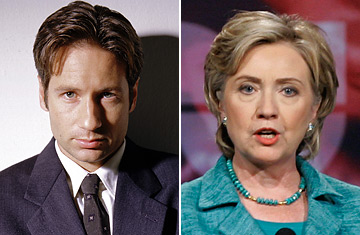
Ever since last month's debate in Philadelphia, Hillary Clinton's opponents have been clamoring for her and her husband to release all the papers from the National Archives pertaining to her role in his presidency. After all, they claim, what better way to judge the experience that she cites as her chief qualification to hold Bill Clinton's old job? So is Clinton holding something back, as her rivals suggest, or is this simply, as she insists, a question of moving "as quickly as our circumstances and the processes of the National Archives permits."
"It's complicated," says National Archives spokeswoman Susan Cooper. "There's no wrong answer and no right answer. It's not black and white."
Like his two most recent predecessors, Bill Clinton is subject to the Presidential Records Act of 1978. Under the law, all records are kept from the public for five years from the time a President leaves office. After that, every President has an option — and all of them have taken it — of withholding for further review six types of records for another seven years. Among the types of documents that can be subjected to further review are confidential advice between the President and his advisers. All three Presidents who have been covered by the act have invoked that option, though Cooper notes that Clinton's order — which called for further review of documents that include negative or derogatory information about individuals involved in the appointment process, confidential foreign policy communications, and communications between the President and Vice President, First Lady, or former Presidents or Vice Presidents — was actually less restrictive than either Ronald Reagan's or George Herbert Walker Bush's.
Even if Bill Clinton were to lift that restriction today, however, it would likely be years before the public actually got to see all of the documents from his presidency. (At the archives, Richard Nixon — whose papers have taken years to sort through and continue to yield bizarre troves of information — is known as "the gift that keeps on giving.") Thanks in part to the technology of the era in which he presided over the country, Clinton generated an unusually large volume of material: an estimated 20 million e-mails, averaging three pages each, plus another 78 million pages, enough to fill something like 36,000 boxes.
Before being made public, each document must be reviewed individually by a handful of overworked archivists. The archivists screen them for privacy issues (there are, for instance, lots and lots of Social Security numbers in all of this material) and potential breaches of national security. Once the archivists scrub them, the documents go to Bruce Lindsey, the longtime confidant whom Clinton designated to handle them. (Lindsey wrote in a recent memo, "Currently, none of the FOIA requests NARA has processed and provided for my review involve Senator Clinton.") And then they go to the current President, who under a 2001 executive order can look at them as long as he cares to.
The first priority is requests pending under the Freedom of Information Act. And any potential political muckrakers must get in a line — a very long line — of nearly 300 FOIA requests. Those requests are given full-time attention by a mere six archivists, whose numbers reflect the budget limitations they are working under.
What's more, the FOIA requests must be dealt with on a first-come, first-served basis, which means that issues of national security or domestic policy don't get priority. On the contrary, as it happens, the first people to get in the Clinton archives queue had a set of requests for information dealing with the issue of unidentified flying objects.
Extraterrestrials, in fact, still seem to be getting an inordinate amount of attention down in Little Rock. If you take a look at collections of material that have recently become available for research you will find:
FOIA 2006-0543-F: Records or correspondence related to President Clinton wanting the Sci-Fi Channel at the White House and Camp David
And
FOIA 2006-0535-F: All files on UFOs in the files of Mike McCurry, White House Press Secretary
And my personal favorite:
2006-0492-F: All files on UFOs, Roswell, New Mexico, flying saucers, Area 51 or the TV show X-Files in the files of John Podesta
Why John Podesta? The Clinton Library helpfully tells us of Clinton's White House Chief of Staff:
FOIA request 2006-0492-F consists of e-mails to and from John Podesta, containing the words either, X-Files or Area 51. John Podesta was a renowned fan of the "X-Files" television show.
Podesta, through a spokesperson, said of the FOIA requests, "the truth is out there." But like all FOIA requests, it may take a while before we get to see it.
